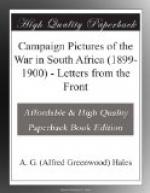Now he is tottering to his fall, amidst the ruins of a crumbling State, forsaken by the Powers that egged him on with covert promises of armed support, abandoned to the tender mercies of his foes by those on whose behalf he drew the sword. Yet, even now, the dauntless spirit of the man rises above the wreckage of disaster. A little band of heroes ring him round. Though every man in all that fearless few is England’s foe, yet we, who boast the Vikings’ blood in every vein, can we not honour them? So did our forefathers stand round Harold when Norman William trod with armed heel on English soil. So stood our fathers when Blucher’s laggard step hung back from Waterloo. Are we not great enough to look with pride upon a gallant foe? Or has our nation fallen from its high estate, has chivalry departed from our blood, and left us nothing but the dregs which go to make a nation of hucksters? If so, then let us leave the battlefields to better men, and train our children solely for the market-place. But these are idle words, born of the spleen which such a thought engenders. Full well I know the temper of our people, terrible in their wrath, but swift to see the nobleness in those who face them boldly.
And these be noble men, my masters. They rally round their chief, as you and yours would rally round a British leader if foreign hordes swept with resistless might over England’s historic soil. All that they loved they’ve lost, and nothing now remains to them but honour and a patriot’s grave; and in the grim game of war it is our stern task to give them what they seek—a soldier’s death beneath the doomed flag which, in their stubborn pride, they will never forsake. But even whilst we hem them round with bristling bayonets, ready for the last dread act in this red drama, let us pay them the tribute due to all brave men; for he who gives his life to guard a cause he holds most dear is worthy of our admiration, though he be ten thousand times our foe. What should we think of men who, left to guard the Kentish fields, threw down their arms and sued for peace to any leader of an invading host because our cause seemed lost? Should we not curse them as a craven crowd, and teach our lisping babes to mock their memory? Would any fair-faced girl in all the British Isles wed any man who would not fight until the sinews slackened with slaying in defence of the homeland? If so, they are not fashioned of the metal of which their granddames were made.
And what we honour as the prince of virtues in a Briton shall we condemn as vice in this little band of Free State Boers and their leader, loyal to a lost cause? No, England, no! It is not you that shriek anathemas to the weeping skies because the foe dies hard. The gutter gamin and the brutal lout who never owned a soul fit to rise above the level of the kettle singing on the hearth may brand the name of Steyn and his stout burghers with infamy; but the clean-souled people of the Motherland, the people from whose ranks our greatest fighters and thinkers spring, will not endorse that cry. No, not though every slanderous throat shall shriek until they cannot wail an octave higher.




